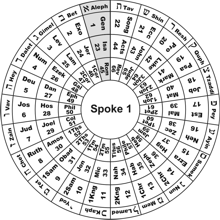The Election of Abraham, the Father of our Faith
Now the LORD had said unto Abram, Get thee out of thy country, and
from thy kindred, and from thy father's house, unto a land that 1) I will shew thee: And 2)
I will make of thee a great nation, and 3) I WILL bless thee (avarekekah), and 4)
make thy name great; and thou shalt be a blessing: And 5) I WILL bless (avarakah) them that
bless thee, and 6) curse him that curseth thee: and in thee shall all families of the earth be blessed.
Genesis 12:1ff (Spoke 1, Cycle 1)
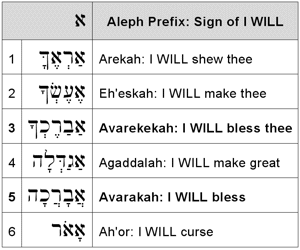
God's choice of Abram (soon to become Abraham), is a key articulation point in the unfolding
drama of redemption. Here God initiated the Jewish race that would give birth to Jesus Christ,
the Saviour of the World in whom "all families of the earth" would be blessed. It is
the Aleph event in the history of the Gospel, and so it is no small wonder to behold how
God conspicuously marked it by using the Aleph Prefix six
times in the expression of His Sovereign
Will for Abram. The corresponding KeyWords are listed in the table. The fifth entry is of primary
significance. It is based on barak, the common word meaning to bless
(BW book pg 150) which appears
over 300 times in the Bible. But the exact form used in the passage above is not common at all.
Its technical definition, which I have abbreviated to the bare minimum necessary for what follows,
is the first person singular imperfect cohortative form of barak. Sorry for the minute details,
but they are necessary to see the great glory of what God has done here. Besides, we live in
"the day of small things" (Zech 4:10), chief amongst them being the microprocessor which allows
anyone with a computer and some software to study the Word as if he had a thousand
well-trained monks to do his every bidding. And so with a few clicks of my mouse I ordered my
micro-monks to search the entire body of Sacred Scripture for every occurrence of the exact form
of avarakah used in Genesis 12:3. The results stunned me. The Bible contains
exactly three occurrences of avarakah, the first person singular imperfect cohortative
form of barak. The first is in Genesis 12:3 above. The other two are from Alphabetic Verses
corresponding to Aleph:
- AV Ps 34:1 I will bless (avarakah) the LORD at all times: his praise shall continually be in my mouth.
- AV Ps 145:1 I will extol thee (aromimkah), my God, O king; and I will bless (avarakah) thy name for ever and ever.
This means we have Alphabetic KeyLinks from two Aleph verses
to the First Book on the First
Spoke, the very Spoke corresponding to Aleph! Furthermore, this double KeyLink strikes the exact
point marking the genesis of the Gospel!

If only I had words to express the impact this had on my soul. I discovered this after writing
the pages above about the meaning of the Aleph Prefix
(BW book pg 125). This exemplifies the abundant fruitfulness of the wondrous Wheel of God's Word.
I have been studying it for a decade, yet every day new knowledge leaps out that not only dovetails
with everything that has gone before but also magnifies the previous understanding beyond all measure!
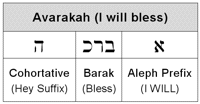
The meaning of this KeyWord is
easy to analyze. It breaks down into three pieces.
The first is the Aleph Prefix which indicates the
"first person singular imperfect," the idea of I WILL.
The second is the triliteral root barak (to bless). The third is the "cohortative ending"
indicated by appending the syllable "ah," also known as the "cohortative of volition." This is the
Hebraic way of emphasizing one's determined intent to do what is stated. In effect,
it is like saying "I really mean it!" And this is what is so very wonderful about these revelations.
God amplified His Promise to the limit of the Hebrew language when He used six Aleph Prefixes and
the cohortative form, but then He took it well beyond the limit of any language by uniquely linking
it to two Alphabetic Verses corresponding to Aleph and engraving it in the geometry of His
everlasting Word! If ever there were a promise we could trust God to fulfill, this is it.
Some verbs that have the cohortative meaning cannot be written with the Hey Suffix
because they already have some other Letter suffixed. This is the case with the third word in
God's Promise to Avram, avarekekah (I will bless thee), which uses a Kaph Suffix
to signify thee (BW book pg 113). Grammarians distinguish these words as "cohortative in meaning but
not in form." If we now expand the search to include these, it returns two blessings from the
Lord Himself (Gen 12:2, 26:3) and two patriarchal blessings (Gen 27:7, 48:9). The theme
remains restricted entirely to the Aleph Alphabetic Verses and the First Spoke.
Finally, if we expand the search to return all verses that use the first person imperfect
(Aleph Prefix) whether co-hortative or not, we find a total of eighteen verses, that
break down as follows: Genesis (8x), Isaiah (1x), Alphabetic Verses corresponding to Aleph (2x), and
others (7x). This means that 11 of the 18 hits (61%) are either on Spoke 1 or in Alphabetic Verses
corresponding to Aleph! The one occurrence in Isaiah is particularly rich. It unites five
Aleph KeyWords:
Hearken to me, ye that follow after righteousness, ye that seek the LORD: look
unto the rock whence ye are hewn, and to the hole of the pit whence ye are digged. Look unto
Abraham your father (av), and unto Sarah that bare you: for
I called him alone (echad), and blessed him (avarekehu),
and increased him (arabbehu).
Isaiah 51:1f (Spoke 1, Cycle 2)
Most in depth commentaries note the word play involved in the Blessing of Abraham.
In his entry on Genesis 12 in the Word Biblical Commentary, Gordon Wenham wrote
"Every mention of the root 'to bless' in this passage is a paronomastic allusion to Abram's name.
Here it is unmistakable (cf. abarekeka 'I will bless you' and abram)." Wenham's "paronomastic" is
just scholastic jargon that simply means "a play on words, a pun." Scripture is saturated with paronomasia.
It is one of God's most effective and delightfully intelligent ways of coloring and expanding His Word to
lead us by implication and association to the shoreline of His oceanic Wisdom. The Book of Isaiah
also has a strong link to Aleph in one of its verses which contains six Aleph KeyWords,
four of which appear in Alphabetic Verses:
O LORD, thou [attah, AV Ps 119:4] art my God
[Elohi,
AV Ps 145:1]; I will exalt thee [aromimka, AV Ps 145:1],
I will praise [odeh, AV Ps 111:1a] thy name; for thou hast done
wonderful things; thy counsels of old are faithfulness [emunah] and
truth [amen].
Isaiah 25:1 (Spoke 1, Cycle 2)
The last two words are central to the dominant themes of Spoke 1, as we now shall see.
Abraham Believed God (Genesis Romans) Romans)
For what saith the scripture? Abraham believed (aman) God, and it was
counted unto him for righteousness.
Romans 4:3 (Spoke 1, Cycle 3)
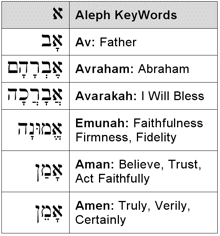
FAITH IN GOD is the first principle of the Gospel. It is the one
and only way for a soul to be right with the Creator. This is how it has been since the
beginning when God first revealed the Gospel in Genesis 15:6, cited by Paul in Romans 4:3 above.
This is the root, the heart, and the soul of the Good News preached with unique clarity
and completeness in Romans, Paul's greatest Epistle. It opens with the declaration of its
central theme:
For I am not ashamed of the gospel of Christ: for it is the power of
God unto salvation to every one that believeth; to the Jew first, and also to
the Greek. For therein is the righteousness of God revealed from faith to faith: as
it is written, THE JUST SHALL LIVE BY FAITH.
Romans 1:16f (Spoke 1, Cycle 3)
The Aleph KeyWords amen and emunah carry the connotation of
faith, faithfulness, belief, truth, certainty, verification, firmness and stability.
It is the word translated as "truly" in the quotes of the Lord when He said "Truly, truly I say to you."
In the Bible, Faith means Reality, which is how God defined it,
saying "faith is the substance (assurance) of things hoped for, the evidence (confirmation) of
things not seen" (Heb 11:1, Spoke 14, BW book pg 284). The connection is obvious; God is
the root of all that is, which means that faith in Him connects the soul to Ultimate Reality. This
is the polar opposite of its caricature as "blind credulity in a fantasy" propagated by unbelievers.
This, the Genesis of the Gospel, is saturated with Aleph KeyWords, chief amongst
them being the first word of the Hebrew language, Av (Father), the Word Picture of the
Leader of the House (BW book, pg 116) which derives its ultimate meaning from the nature of
the eternal Godhead, the First Person of the Trinity, God the Father. God used this word when He
chose Avram to be the father of the multitude that would come to Him through faith in the Lord Jesus Christ.
This event is recorded in two and only two passages of the entire Bible; it is a Spoke 1 KeyLink.
The Hebrew passage in this KeyLink contains four Aleph KeyWords – Av, Avraham, Avarakah (I will bless),
and Emunah (Faith) – and many other words that begin with the Aleph Prefix. As with Genesis 12, God's
Will is stated with absolute clarity:
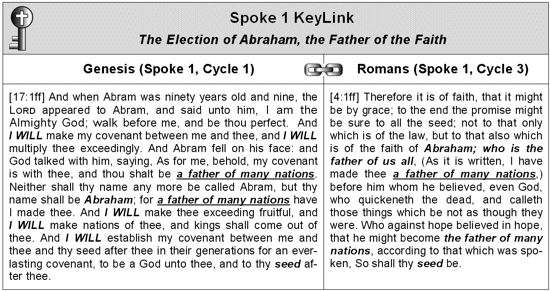
This is but one of a host of KeyLinks between Genesis and Romans, as discussed in the Synopsis of Spoke 1 in the Bible Wheel book.
Next Article: Romans: The Cathedral of the Christian Faith
|
